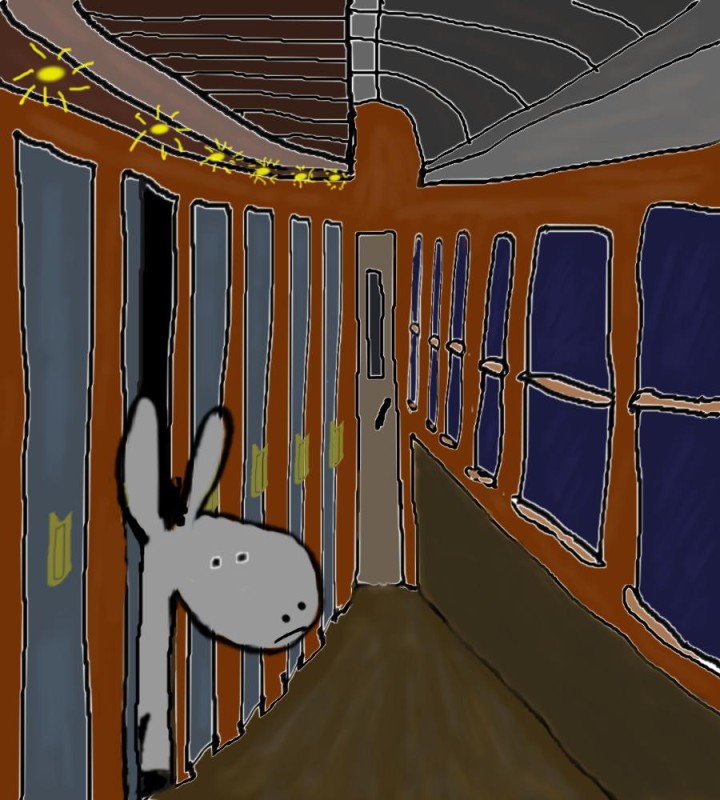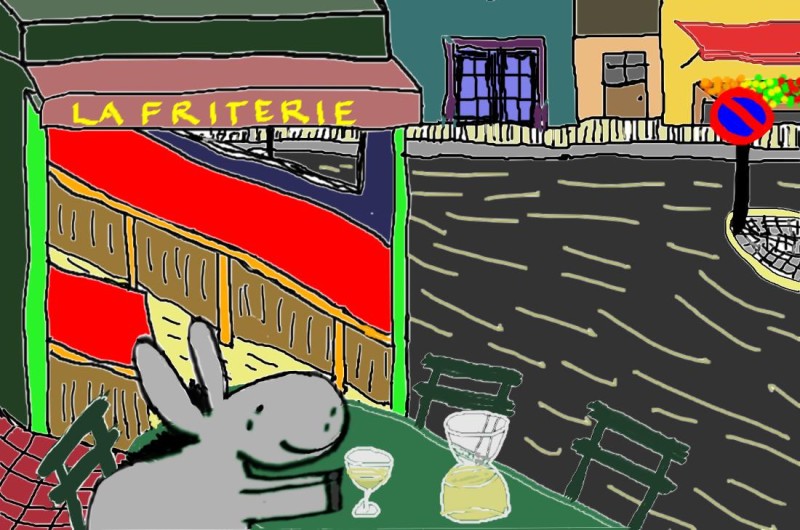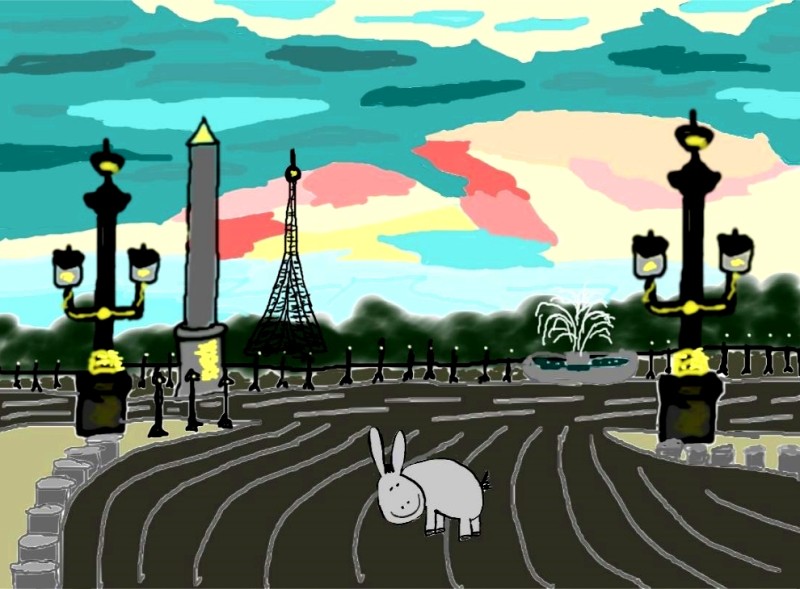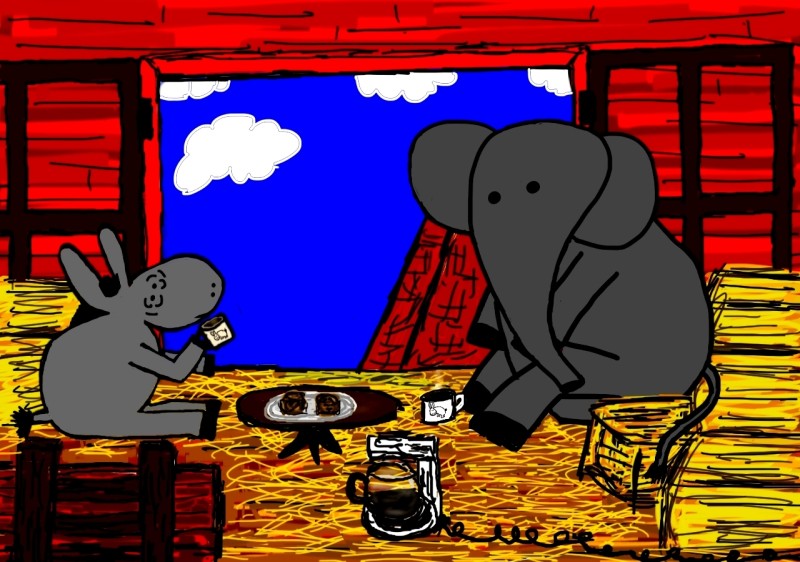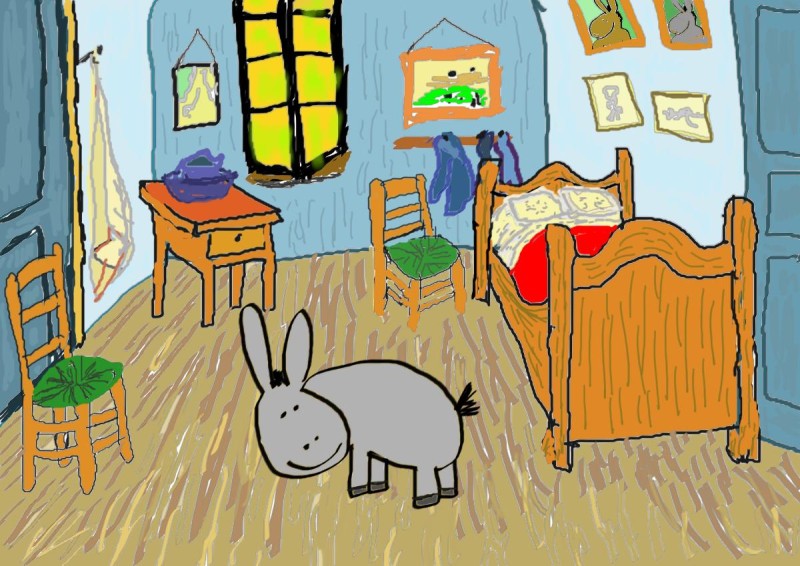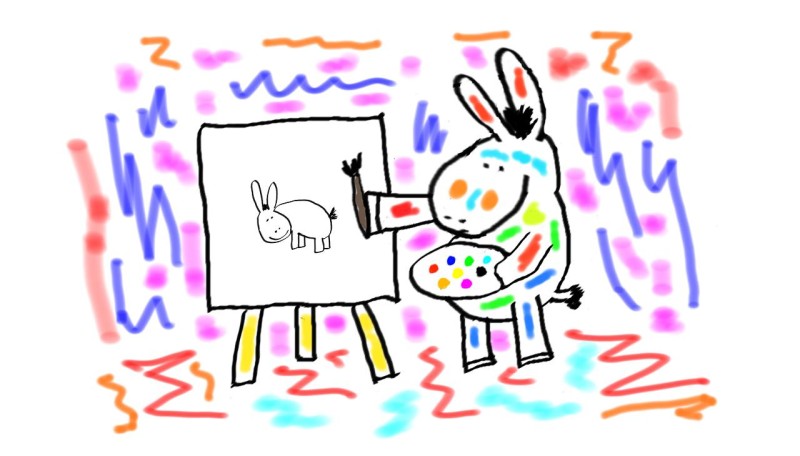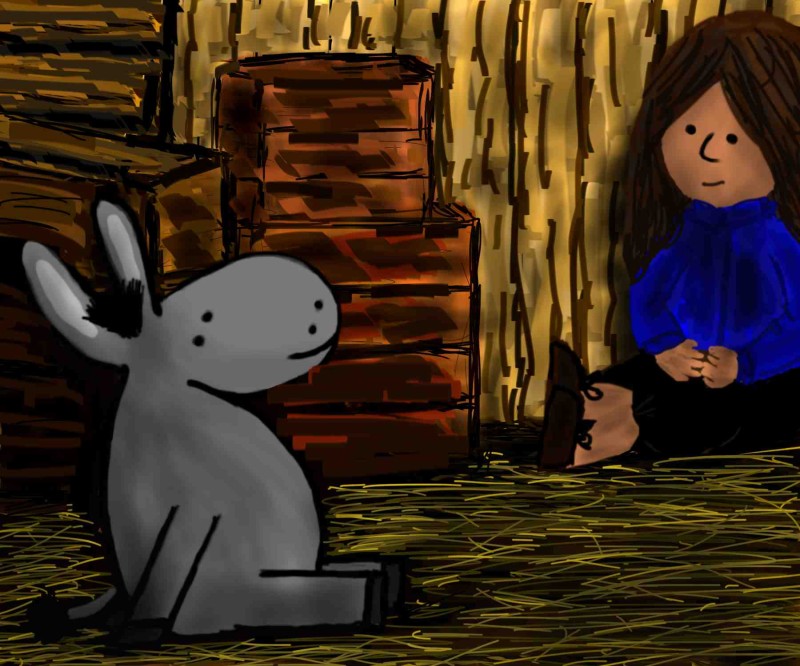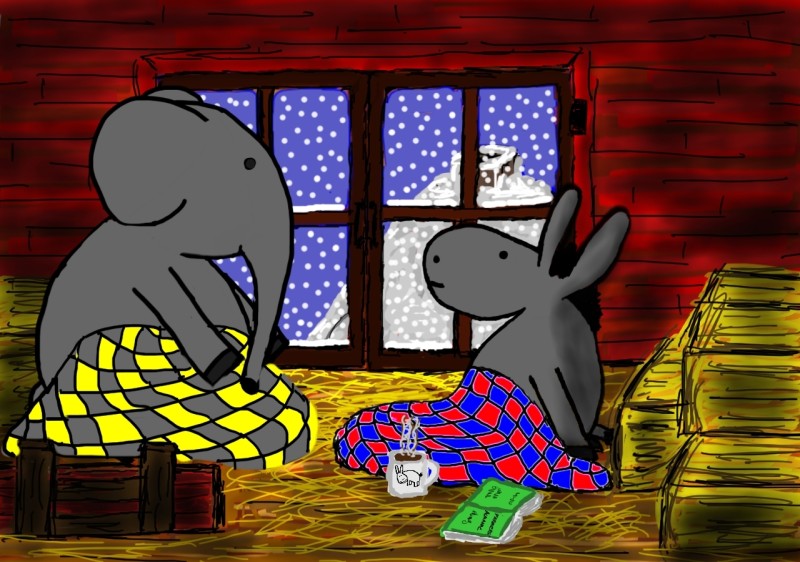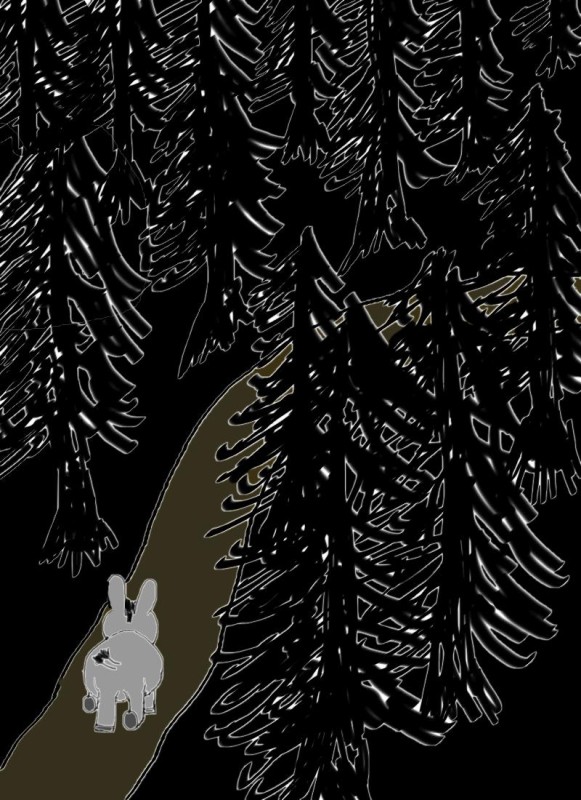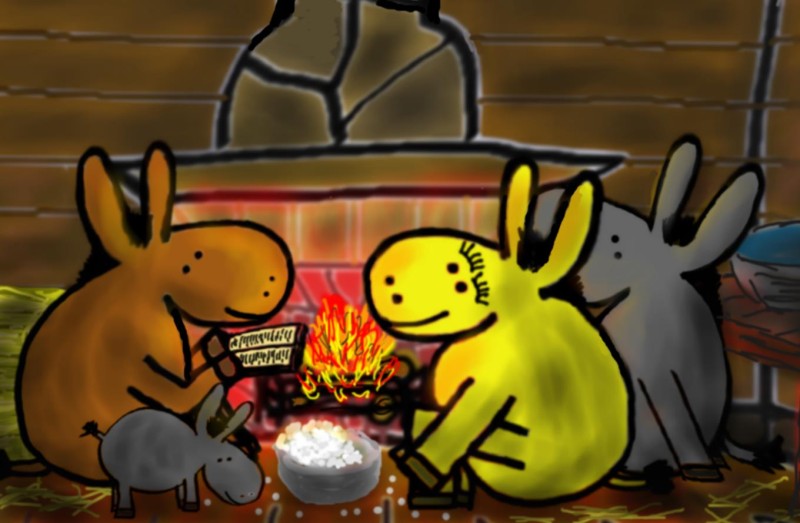Which way to the WC?
Category: Journeys
“Blurtso takes a trip” (III)
Wow! thought Blurtso, this wine is good! And so refreshing! When I touch the glass, the warmth of my hoof makes the condensation run down the stem. And the base leaves circles on the table. I wonder if I should drink the entire carafe? It sure is good. And very refreshing. It may be the most refreshing wine I’ve tasted. It was sure hot at the Tower. I didn’t think I’d ever get to the top. And all those people, they weren’t even sweating! I think they should install an elevator. Or serve wine. A glass of wine would have really hit the spot. I wonder if Picasso drank wine? I wonder if he sat in his museum with his paintings and drank wine. I wonder if he took his easel and his wine to the top of the Tower to paint the view… the view is nice from here. The street is quiet and the café is well-lit and clean. Hmmm, the condensation has formed a puddle around the carafe. I’d better pour another glass. I don’t want to offend the owner. I wonder if he drinks this at home? He said it was house wine, so he must drink it at home. I wonder how he makes it? I wonder if it’s hard to make something so good. Or easy. It’s certainly easy to drink. Wow! This second glass is better than the first! That’s amazing. I wonder if the second glass seems better because that’s what I’m drinking now? It’s nice when the second is as good as the first, and vice versa. There’s certainly a lot of pleasure in the liquid in that carafe. What an interesting word, carafe. I wonder where it comes from? Probably Africa. It has a long neck, and is good when it’s hot, and sounds like giraffe, so it must come from Africa. I think I’ll pour another glass. There’s only one left, and I would hate to offend the owner. What a great café. The Tower was nice, but this is a really great café.
“Blurtso takes a trip” (II)
“Blurtso takes a trip” (I)
“Starry starry night”
“The journey of Ditto Lundif” (II)
Did you stash the treasure? said Ditto. The treasure? said Virginia. Yes, said Ditto, the gold coins. I don’t have any gold coins, said Virginia. Splendid, said Ditto, I knew I could depend on you not to tell… now, if we could only get out of this refrigeration car before we freeze… did you bring the nail polish remover? Nail polish remover? said Virginia. Yes, said Ditto, to dissolve the teeth on the tumblers in the lock… hey… what was that?! What was what? said Virginia. That noise, said Ditto, it sounded like a wild boar gnawing on a human bone. I think it’s a squirrel on the roof, said Virginia. Yes, said Ditto, a whole family of wild boars launching themselves madly at the train… it’s a good thing I worked with wild boars in the circus, and can reproduce the high-pitched squeal that halts them in their tracks… quick, the nail polish remover…
“The journey of Ditto Lundif” (I)
Isn’t this exciting? said Ditto. We’re not moving, said Virginia. Sure we are, said Ditto, can’t you hear the rumbling of the wheels, and the click of the rails? No, said Virginia, I can’t hear anything. I wonder where we’re going? said Ditto. We’re not going anywhere, said Virginia. Just think of the places we’ll see, said Ditto, and the adventures we’ll have. In an empty boxcar, said Virginia, on an abandoned track? I think I’ll ring for the porter, said Ditto, would you like an hors d’oeuvres or cocktail, or perhaps an extra pillow? A pillow would be nice, said Viriginia. And a blanket for your feet? Yes, said Virginia. I’m going to order a pumpkin colada, said Ditto, with a hay omelette and a side of sprouts. I’ll have a bowl of strawberries and cream, said Virginia, if they haven’t run out. Mmm, said Ditto, me too. Where do you think we’re going? said Virginia. I’m not sure, said Ditto, but it’s bound to be exciting, and an amazing adventure.
“Blurtso loses track” (IV)
I’ve opened and closed the latch on this barn door every day for three years, said Blurtso, and I can’t remember what it looks like… I couldn’t begin to describe it, or describe a thousand other things I’ve used again and again and again. Yes, said Harlan, that’s the way it is, we stumble blindly along, and then one day we’re gone and only the forgotten things remain.
“Blurtso sees a light”
“Blurtso visits his friends in Concord” (IV)
What a great day, said Blurtso. Yes, said Pablo, as good as it gets. What shall we do now? said Bonny. I don’t know, said Pablo. How about a story? said Bonny. Yes, said Blurtso, a story! Very well, said Pablo, I’ve been reading a novel titled, The Adventures of Captain Harvey, perhaps I could read a chapter out loud? What’s it about? said Bonny. It’s about a character, said Pablo, called Captain Harvey, who has the ability to take on the personality of whomever or whatever he encounters. Like a chameleon? said Blurtso. Yes, said Pablo, just like a chameleon. Now, in the chapter I will read Captain Harvey has arrived at a village in the mountains north of Rome, and he has been taken in by a middle-aged couple, Elio and Agnese, and their adopted servant girl, Fiammetta. Go on! said Bonny. Yes, said Blurtso, go on! Alright, said Pablo, it begins like this…
“While the days were dedicated to caring for the animals, bringing wood and water, and preparing meals, the nights were passed in front of the fire, as the four residents and whatever neighbors happened to stop in would settle down to talk. Early on, the conversation would focus on what work had been done that day, and what remained for tomorrow, and then it would turn to the latest report of rumors. At some point, Elio would excuse himself to join his friends at the bar. On this night, Agnese scolded him, ”
“Good company?” said Elio. “Fiammetta says nothing, and you and Harvey go on like old women!”
“Well!” said Agnese. “If you ever said something… Why don’t you tell a story? You used to tell such fine ones. I’m sure Harvey would enjoy one.”
As Elio paused to consider which story he might tell, a stream of protagonists, antagonists, climaxes and anticlimaxes rushed through his head, but before he could choose one, Harvey began for him:
“Filomena was fifteen years old,” said the captain, “when her grandmother told her, ‘If you want your child to be a boy, you must sleep on your right side and have your midwife use water in which a murderer has washed his hands…’”
Elio was relieved, for he was too tired to make something up, and he liked having stories told him, because then it was real and not just remembering, so he put a log on the fire and sat back down in his place.
The story Harvey told, though taken directly from Elio’s memory, was not as Elio remembered it, for just as the log began to crackle and whine in the fire, it altered the captain’s tale until the listeners could hear the cracking of a whip, or the cries of a forsaken child, or the moans of an impassioned lover. What our hero told, in fact, was the history of the life of the log, of its stored energies released into the arms of the air. The listeners were enthralled. Even the romantic encounters, which surprised them with their attention to detail, were done with such delicacy that Agnese could not be offended, and Fiammetta moved into the light.
The group would listen, apprehensively at first, wondering if he would improvise or tell a stock tale from one of their memories. If it was early, he would spin the yarn leisurely, amplifying here and interpolating there, always going on in a steady, gentle voice, except when he impersonated a man or woman in the throes of passion or a demon in a fit of rage. Then he would pause, anticipating with his silence the pleasure certain to come, and as the fire began to wane the pauses would become shorter and less frequent, and he would bring the story to an end, reuniting lost lovers or reconciling the hero to his fate, and leaving the group with a feeling at once of fulfillment and loss.
Each story was different, taking its theme from the nature of the wood. There were stories of those who reached the happy end they had sought, or those who obtained what they desired or regained what they had lost, or those for whom love had an unhappy ending, or those who won happiness after grief and misfortune. And there were the stock tales of the tricks played by men upon women, or women upon men, or men upon men and women upon women, and each was born of the same fiery source. It was not long before Harvey began to look at everyone he met in terms of the fire. What kind of flame was Elio? Was his wood slow and deep, or superficial and smoldering at the edges? What was Agnese? What was Fiammetta? What was he…?
